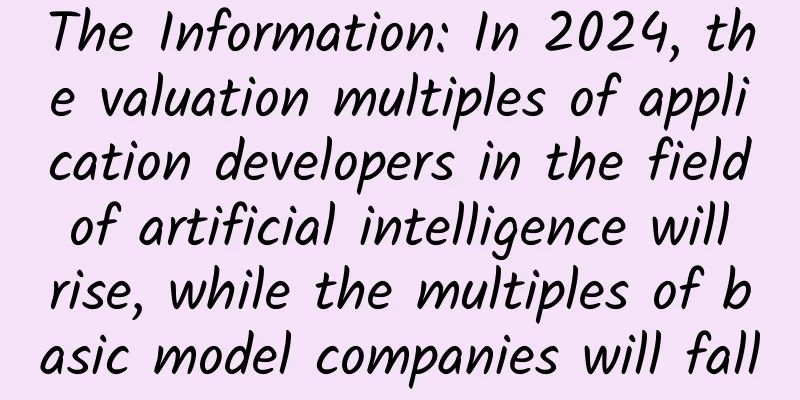The Information: In 2024, the valuation multiples of application developers in the field of artificial intelligence will rise, while the multiples of basic model companies will fall

|
While Open AI and Anthropic's revenue multiples have fallen over the past year, those of AI app developers like Perplexity and Writer have risen, according to an analysis of valuation and revenue growth for more than a dozen AI startups. Image source: theinformation You don’t have to look far to find examples of AI startups receiving high valuations, as some ongoing robotics deals and startups founded by OpenAI alumni have shown. But these examples mask a change in the way investors value AI startups. The largest developers of foundational models, such as OpenAI and Anthropic, are now cheaper than they were a year ago based on their annualized revenue valuations. This is typical as companies age over time and their revenues catch up to investors’ high expectations. What’s more unusual is that some AI startups are maintaining high multiples even as revenues rise. Startups focused on developing applications for consumers and businesses still trade at relatively high revenue multiples compared to a year ago. For some startups, such as AI search engine Perplexity and generative AI tool maker Writer, multiples have even risen. Investors say they are willing to place such high valuations on AI applications because revenue is growing much faster than software applications in the previous decade. These investors say companies are spending more on AI because they see the software can make workers more productive and reduce costs. “AI companies are experiencing tremendous growth like never before. That’s why people are predicting these growth rates and basing valuations on them,” said Jai Das, president and partner at Sapphire Ventures, which has invested in business search chatbots Glean and Perplexity. Perplexity, for example, surpassed $80 million in annual recurring revenue in January — the value of its subscriptions over the next 12 months, according to a person with direct knowledge of its financials. That’s 60% higher than the $50 million rate in November, when it raised money at an $8.5 billion valuation, resulting in a staggering revenue multiple of 170. Last March, its revenue multiple was about 63. The three-year-old company sells subscriptions to its AI-powered search engine and has expanded into other businesses such as advertising and provides developers with access to its models through an application programming interface. It’s hard to get a comprehensive picture of valuations for AI startups because their financial data is closely guarded. But data gleaned from The Information’s coverage of more than a dozen AI startups that raised funding in the past six months can give a sense of how investors value them. For consistency, The Information uses pre-money valuations, although venture capitalists often also consider these post-money valuations, or valuations that include new capital. Investors are giving the highest multiples to young startups that target clients in a certain industry — such as healthcare or law — in AI applications. Investors say training models on sensitive proprietary data to tailor them specifically to those industries could give them a competitive advantage. For example, Abridge, a six-year-old startup that uses AI to transcribe doctor-patient conversations, adapts other companies’ AI models to recognize medical terminology and point out important details in patient-doctor conversations based on the medical issue being discussed, said co-founder and CEO Shiv Rao. Last fall, investors rewarded those efforts by valuing Abridge at $2.5 billion — 50 times its $50 million in annual recurring revenue — with a $250 million investment. Not all AI applications have higher revenue multiples than in previous rounds. For example, three-year-old legal AI startup Harvey received a $2.7 billion valuation earlier this year, a pre-money valuation of about 54 times the $50 million in annual recurring revenue it reached in December. Just a year ago, investors valued the startup at $635 million, or 64 times its annual recurring revenue at the time. Last fall, Glean raised money at a $4.3 billion valuation before the funding round, which equated to 43 times its $100 million in ARR at the time. When it raised money at a $2 billion valuation in late 2023, investors valued it at 67 times its $30 million in ARR. Meanwhile, revenue multiples for the largest AI companies have fallen as revenues have surged. Anthropic is closing a funding round that values the maker of the chatbot Claude at $58 billion before the money. That’s about 58 times its $1 billion in annual revenue, according to a person with knowledge of its finances. Just a year ago, the San Francisco-based company was valued at about 150 times its $100 million in annual revenue. Open AI’s revenue multiple also fell, but to a lesser extent. Its latest funding round valued it at $260 billion, a pre-money valuation of 43 times its projected annualized revenue of $6 billion. A year ago, a secondary offering valued it at $86 billion, equivalent to 54 times its annualized revenue. This article is translated from: theinformation |
>>: MBP battery life collapses: Why does Apple resort to such tricks to cover up its shame?
Recommend
Ji'an SEO Training: How to increase the click probability of your website? Develop a comprehensive click strategy for new users
How to trigger more users to click on the website...
About 1.5 billion people have hearing loss! Noise-isolating earplugs vs. noise-isolating earmuffs, which one is better and how to choose?
The World Hearing Report released by the World He...
3,000 km "Green Great Wall"? China's largest desert is surrounded! | Environmental Trumpet
Hello everyone, this is the 24th issue of the Env...
Li Zhongying's "The Way of Life" talks about the difference between the laws of nature and the laws of man, and describes the way to a happy life
Training course video content introduction: Gains...
Friends who have high private WeChat visits to Chengdu Tea Tasting are recommending [worth collecting]
Chengdu Tea Pincha’s private WeChat account: Seni...
Health Tips | What is the reason for "sleep paralysis"? Here is the scientific explanation
Many people have experienced this situation: when...
Why can Dingdong, the smart home portal that Google and Apple are competing for, monopolize 80% of the industry's sales?
On July 26, Wu Yifan, who showed off his freestyl...
China's color TV industry is once again experiencing an unprecedented reshuffle. Who will be kicked out?
In the past March, a large number of mainstream c...
A collection of Father’s Day poster copywriting, Durex is the best! !
For the upcoming Father's Day, many brands wi...
ESA sent a glass of "juice" to Jupiter, or will it reveal the mystery of the "ice moon" there?
Jupiter is the largest planet in the solar system...
What is the interest rate of the special national debt for fighting the epidemic? How to buy the 2020 special government bonds
On June 18, the special government bonds were iss...
Is this a launch site or a zoo?
As we all know, the Kennedy Space Center in the U...
How much does it cost to be an agent of Chizhou Sign-in Mini Program? What is the price of being an agent for the Chizhou Sign-in Mini Program?
What is the price of being an agent for the Chizh...
How can I increase the number of followers by creating a museum account on Douyin?
The author of this article breaks down the operat...
Why does covering your ears make your own speech louder?
In daily life I wonder if you have noticed a stra...









